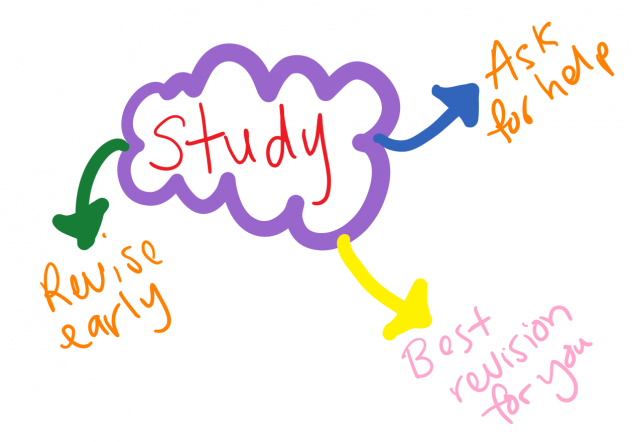 After over seven years of sitting exams, I thought I’d share my experience through little tips and tricks you may find useful!
After over seven years of sitting exams, I thought I’d share my experience through little tips and tricks you may find useful!
1. Study. It may sound simple, and I can hear you thinking “duhhhh” but the best way to be the least stressed before an exam is to prepare correctly! My tips:
- Revise from week one! A little re-reading, reviewing and revising after every lecture is the best way to go. If this seems like too much for you, make sure you start regular revision of course content from week 8 or 9 and keep it up till your exam.
- Find out which revision format works for you by trying different methods. I personally prefer making flow charts, mind maps, cue cards and posters but others might prefer writing out the content in their own words, reading text books or listening to recordings of the lectures. Once you find out the best way you revise, you can be the most effective at retaining the course content.
- Don’t leave any stone unturned! Make sure you cover ever section of the course and ask for help with anything that doesn’t make sense to you (meaning talk to lecturers, tutors, PASS leaders, learning skills advisors or private tutors). This will stop the “Guhhh, I should have revised this” syndrome during the exam. It may help to make a SWOTVAC plan to make sure you cover everything important!

2. Prepare your cheat sheet or open book materials well!
Sometimes you will be allowed to bring in material to your exam but make sure you prepare it well. If you are allowed a cheat sheet, write it clearly and don’t waste space. Writing in different coloured pens can help you identify what you need faster. Although obvious to you, I want to make it clear that it is very important to write your cheat sheet yourself because you need to know it like the back of your hand and borrowing a friends will cause more trouble than being useful if you can’t find the correct definitions or equations that you need.
If you are allowed open book don’t be fooled by this. It is useful to have lots of notes except if you have no idea what they say. So revise the notes you are taking in and become familiar with using them with practise questions. Take as much useful course material as you can but do not try to learn content in the exam. It is neither the time nor the place and you will only result in time lost and increased stress.

3. Where to go when?
Know exactly where and when your exam is and what time you are required to be there. You can find out at the FedUni website and through your lecturers.
https://federation.edu.au/current-students/essential-info/administration/exams/exam-timetables2
Make sure you arrive early as carparks can be difficult to find on exam day and running to your exam during reading time is seriously not advised (trust me, it causes stress to the max for sure).
If you have no idea where the exam hall or room is it could be a good idea to go for a stroll over to the building the day before and get to know the space.

4. Bring the best materials like pens (3 blue and a black should be plenty), pencils, erasers, pencil sharpeners, highlighters, calculators if allowed, and any other material your lecturer or tutor recommended. Also bring a drink bottle and a warm jumper or layers. You definitely can’t rely on the room to be a perfect thinking temperature so take that factor into your own hand. Most importantly, don’t forget your student card as it allows you to take the exam!

5. Be early and use the toilet. I like to arrive 20-30 minutes before the exam to go to the toilet, take a few calming breaths of fresh air and find out my seat number. I also enjoy a quick chat to my friends but make sure you don’t talk about the stress of the exam or negatively about the outcome of the day. Keep a positive attitude to make the most of the day! Plus you’ve got this, you are ready and will do great!

6. Read and follow the instructions. Make sure you follow all instructions given by the supervisors and exam paper. Your first instruction will be seating. You cannot seat wherever you like. Instead you will be given a seat number and are required to take your exam from that seat. After you have all been seated the main supervisor will read the exam instructions aloud to the hall. Follow what they say as well as what is printed on the exam cover page. Apart from no cheating, the most important two instructions are no talking from the moment you walk into the hall and you can’t start the exam till advised. If you do not listen to these rules they can take your exam away and give you an automatic zero, so please listen!
7. Use reading time well. Some may say reading time is useless but no matter what you say, it is vital that you use every minute you have to get the best marks you can! I think the two best things to do in reading time is make sure your paper is correct and get an overview of what questions are on the paper. I sat a very important medicine entry exam last year and it turned out my paper, along with 150 other students, was printed wrong with pages from section 3 in section 1 and missing questions. This did increase our stress levels but lucky we used reading time to check the paper or we would get a rude shock when the results were released.
By getting an overview of the paper and what you are about to begin, you are mentally preparing the best way to tackle the paper and how to finish on time. You are also giving yourself a good start to thinking about the ideas needed.
8. Keep track of time. Bring in a watch (make sure it matches with the clock the supervisors are using) and know where the nearest clock is in the room. An exam is testing your knowledge and skill in a timed environment therefore make sure you don’t let time beat you! Make a quick schedule and therefore decide at the beginning of the exam to finish a section by a certain time and keep to your schedule. If you fall behind or can’t finish the exam on time, complete the parts that you know really well to get as many marks as you can.

9. Chill out during the exam. Remember to keep a cool head during the exam using techniques like positive self-talk, taking a short break by taking a look up and around the room, having a sip of water or a quick trip to the toilet. If your exam is particularly long, don’t be afraid to go to the toilet because the movement will wake up your brain and get you back on track if you are feeling sleepy. I often decide well before the exam starts when I want to take a toilet break to be the most productive.
10. Treat yourself afterwards and bask in the relief that’s its finished and decide to be excited about the outcome, instead of nervous.

Photo used from Canva and http://inhabitat.com/diy-homemade-bath-and-body-products-to-gift-or-make-for-yourself/bath-salt-and-bubble-bath/
Good luck wonderful students and I wish you every success!
– Bella